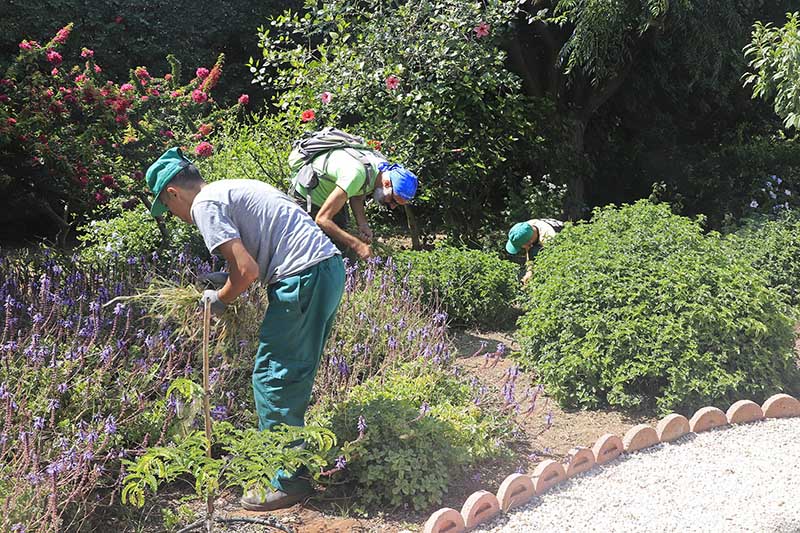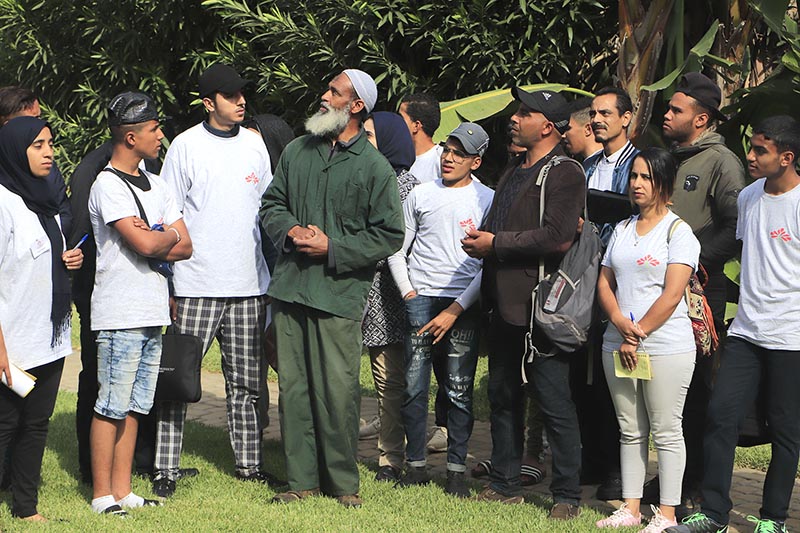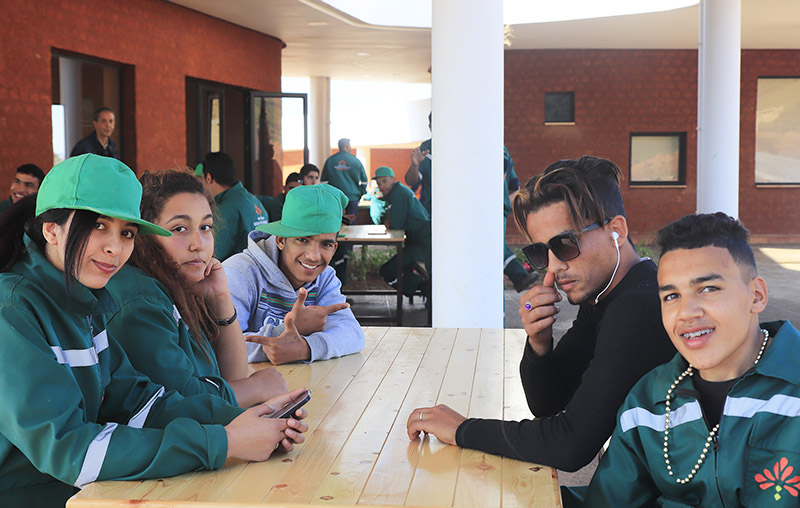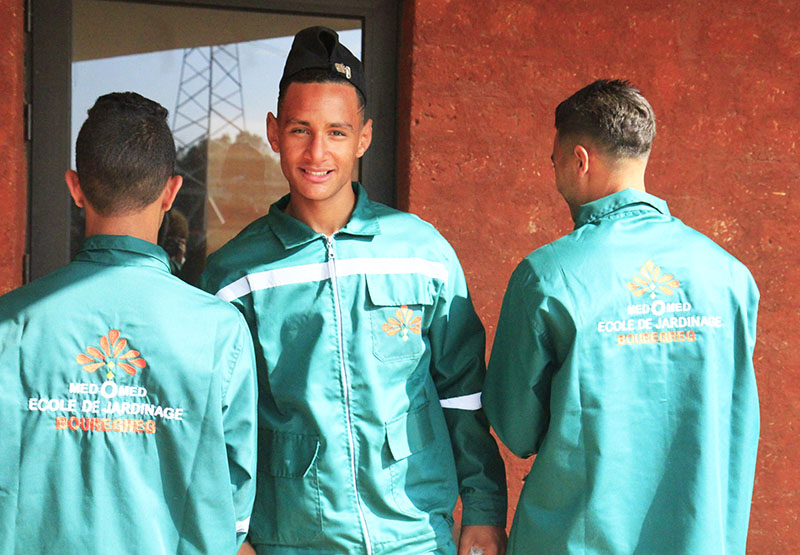Family grows. On October 1st, first-grade students joined in, along with those entering second grade after having obtained their professional training certificate. Out of the 30 trainees, 25 earnt it after a year of theoretical and practical work. Along with them, the number of trainers has also grown, some coming from Spain, some Moroccan trainee teachers.

In spite of the problems and delays common in the launching of a project of this magnitude, we can state that the results for the first year 2018-2019 have been more than satisfactory. We have witnessed a great evolution among our young trainees, not only with regard to their knowledge on gardening, but also to their employability skills: sense of responsibility, persistence, sociability, discipline…
On October 1st, first-grade students joined in, along with those entering second grade after having obtained their professional training certificate.
Collaboration and understanding within the school’s Spanish-Moroccan team –trainers, director, office workers, technicians– has been excellent, as has been their presentation to the new 2019-2010 members of the team: Enrique, Abdou, Ahmed…
Results of the 2018-2019 year
On balance, we consider that up to this point it has been a magnificent and enriching experience. Although not without difficulties, the knowledge achieved through our day to day work has helped us to overcome them. One of the main difficulties we faced on the first year was the diversity of the group of students, not only regarding their age (most of them were very young, and, therefore, immature), but also regarding the starting level of every student, very uneven.

As a professional training center, recognized by the Ministry of National Education and Professional Training of Morocco, the minimum conditions to access the School were to be able to read and write, and to be between 15 and 40 years old. Most of the school students are 15 to 18 years old. For this new course, we have been more strict in the selection process, without forgetting, of course, the social nature of the project, the enthusiastic and “family” spirit that allows us to overcome any obstacle.
Professional training centers offer a 20% of theoretical teachings, and an 80% of practice learning, carried out in a professional space.
Professional training centers offer a 20% of theoretical teachings, and an 80% of practice learning, carried out in a professional space (companies, institutions, etc.). We have implemented this learning model successfully, through the work of our educational heads, Alberto Juan y Seva, from the University of Seville, and the landscaper Mikel García de Eulate. The field work was carried out in the School premises, but it was complemented with outside work: in the Marina of Salé, the Chellah archaeological site, and the Spanish Residency, among others.
During this course, we intend to increase field work in the School grounds, through the building of a greenhouse and the planting of many agricultural ornamental species, for the reproducing and selling of seedlings.
Visits and activities
Visits to the different green spaces were also a success, especially among youngsters. Among them, it is possible to highlight the importance of the visit to the Botanic Garden of Rabat (JEB), where FUNCI maintains an Al-Andalus style garden and a small museum on water in Al-Andalus, created in 2012.

We also visited Bouknadel Exotic Gardens, the Mamora Forest, and the garden of the French Residency. This last activity was specially inspiring for the trainees, as it was carried out on the occasion of the award given by the French Ambassador to his seasoned Moroccan gardener, who then explained the grandeur of the job and its particularities, from a sustainability approach.
School grounds, through the building of a greenhouse and the planting of many agricultural ornamental species.
Another milestone was the participation of the students in the Road for Peace, organized annually by the Diplomatic Center of Rabat in favor of different social projects launched by Moroccan NGOs. Throughout this 10 km race, many students, but also several trainers, showed their good physical fitness, in an activity that has more followers every year.
Collaboration agreements
We also received a wide variety of visits, a proof of the interest this project and profession arise, which contributed to increase the students’ self-teem and their value for their studies. The Friends of Fatima Mernissi Association, whose members include figures such as Farida Benlyazid, Asma Lamrabet o Aicha Belarbi, as well as the regional Director of SOS Children’s Villages, the Iraqi Alia Al-Dali, and several members of the diplomatic corps, were among the most prominent visits.
This new academic course will not only allow the trainees to increase their theoretical and practical knowledge, but also to launch income-generating activities.
We also had the chance of signing collaboration agreements with the department of international relations of the International University of Rabat, and the RIAM (Network of Agro-ecological Initiatives in Morocco).

This new academic course will not only allow the trainees to increase their theoretical and practical knowledge, but also to launch income-generating activities. These are essential for the project’s economic sustainability, allowing it to decrease its dependence in sponsors and subsidies. Thus, we will open a restaurant of seasonal products, we will initiative the reproduction of plants destined for sale and the “garden centre”, as well as the promotion of workshops and courses aimed both at the general public and the field’s specialists.
Acknowledgements
The Shool of Gardening Bouregreg Med-O-Med is carried out in collaboration with the Agence pour l’Aménagement de la Vallée du Bouregreg (AAVB), and thanks to the support of INDH (Initiative Nationale pour le Développement Humain), le Ministère de l’Education Nationale et de la Formation Professionnelle, teh Entraide Nationale, the Región de Rabat, Salé, Kenitra, the Fundación Drosos, the AECID (Agencia Española de Cooperación Internacional para el Desarrollo) and Alsa.
We are very grateful to all of them.
This post is available in: English Español

